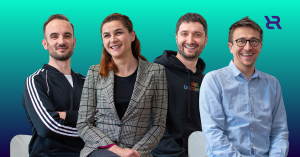With agentic AI, the role of а CFO is undergoing its biggest transformation since the introduction of spreadsheets, according to international finance leaders speaking at Money 20/20 in Amsterdam last week.
As AI begins handling routine tasks from expense processing to compliance monitoring, CFOs are discovering they need new skills and many are struggling to catch up.
That’s why Payhawk and Starship Technologies decided to join forces and create a Finance Tech webinar series to help executives understand how fragmented finance tools create hidden costs and inefficiencies, and how AI can provide the visibility needed to eliminate waste and maximize ROI.
On the 18th of June launch panel, Andrew Rudchuk (Head of Finance Systems at Starship Technologies) will share a corporate practitioner’s perspective on wrestling value from complex systems, while Tsvetina Yancheva (Payhawk’s Director of Product Marketing) will offer insights into the new solutions like AI agents.
The discussion, moderated by Payhawk’s Senior Communications Manager Georgi Ivanov, promises to delve into how their team can “turn things around when juggling multiple systems” and finally close the ROI gap in finance tech
“We’re creating reverse mentorship programs – younger AI-native hires teaching senior professionals while learning business context,” said Konstantin Dzhengozov, CFO of Payhawk. “It’s a completely new leadership dynamic where managing hybrid teams means AI agents handle defined roles while humans focus on strategy, judgment, and stakeholder relationships.”
The knowledge gap
The AI transformation is happening faster than many anticipated. While 56% of US CFOs already use AI for the majority of their financial decision-making, only 1% consider themselves “mature” in AI deployment, according to data from McKinsey data.
Many organizations use a snippet of the systems’ capabilities that they pay for. Companies invest heavily in ERP (enterprise resource planning) and EPM (enterprise performance management) systems, but often end up scratching just the surface of these tools’ potential as they lack the knowledge on how to use it efficiently.
In one survey of large enterprises, respondents admitted they use only about 64% of their systems’ core features on average. Nearly half even confessed they “don’t need” all the capabilities of their pricey software – an indication that many features go unused either because teams genuinely find no use for them, or more likely, because they lack the time and training to apply them effectively.
Payhawk’s CFO spots this as a symptom of a broader knowledge and training gap that is quietly costing businesses millions.
“We’re teaching AI literacy the same way we once taught Excel proficiency,” revealed Dzenghozov during a panel discussion at Money 20/20. “It’s not just about using AI tools, but understanding their capabilities, limitations, and strategic applications.”
With the lack of knowledge comes lack of trust in the new technologies. During the panel, it was noted that up to 54% of US CFOs cite security and confidential information concerns as their primary barrier to AI adoption, while 37-46% worry about AI accuracy and regulatory compliance.
“The biggest barrier wasn’t technical—it was building trust,” Dzhengozov reflected on Payhawk’s AI implementation. “CFOs need to know AI won’t compromise control or security. That’s why we designed our architecture so agents can only perform actions within the user’s existing permissions.”
The need of a new CFO skillset
When leaders trust AI to handle more operational tasks, the CFO’s role is evolving toward what finance leaders describe as “strategic foresight” rather than pure financial scorekeeping.
“As AI advances, distinctively human skills – critical thinking, relationship management, ethical reasoning – become more valuable” Dzhengozov emphasized.
Future CFOs will need to master:
- Prompt engineering expertise: Communicating with AI systems and guiding AI reasoning within business context
- Data governance for AI: Understanding how data quality directly impacts AI performance and business decisions
- Trust architecture design: Building systems that balance automation with control
- Human-AI team leadership: Managing hybrid teams where technology and humans collaborate on strategic outcomes
In Dzhengozov’s team at Payhawk, AI agents are already delivering measurable results. Their Financial Controller Agent autonomously manages expense lifecycles – creating receipts, analyzing documents, and flagging anomalies.
As a result, finance teams have reduced time spent on receipt management by approximately 70%, with purchase request processing time dropping by over 50%.
“We’re closing monthly books 3-4 days faster,” Dzhengozov noted. “That’s real capacity freed up for strategic work.”
A finance tech forum for CFOs
CFOs and finance VPs who have spent careers in accounting or FP&A won’t magically become experts in AI, integrations, or the nuances of various ERPs. They need forums to learn, ask candid questions, and hear from peers who’ve navigated similar challenges.
That’s why an emerging trend in the finance world is the rise of knowledge-sharing platforms and events specifically tailored to this tech education void.
One such forum is the upcoming “Finance Tech: Are We Using It, Or Is It Using Us?” webinar that directly addresses the skepticism and confusion that many finance teams feel about their systems.
Subsequent webinars in the series are set to explore topics ranging from integrating finance data for better forecasting, to change management strategies that can overcome internal resistance to new tools.
To join this June 18 online executive dialogue at 2:00 PM CET, finance leaders can register directly through Payhawk’s website to guarantee their access to the strategic discussion.







